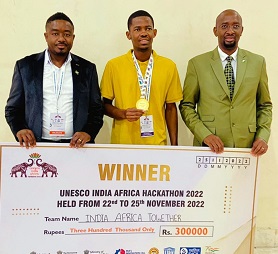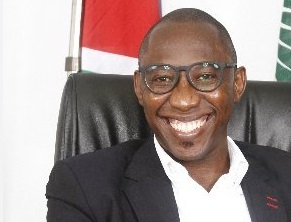
UNAM student shines at the UNESCO India-Africa Hackathon

The UNESCO India-Africa Hackathon awarded twenty competing teams as winners, of which one winning team had a University of Namibia (UNAM) student, Shaun Tjikumise as a member.
The education fair centred on five themes including health and hygiene, agriculture, water and sanitation, energy, and education.
UNAM said Tjikumise and his team worked on the agriculture theme, developing an application that predicts the best fertilizer for specific crops, using machine learning.
Tjikumise is a third-year student, doing a Bachelor of Science (Hons) in Information Technology.
Tjikumise said he made friends from all over Africa and India and he learned a lot in terms of programming and cultural awareness.
Leonard Imene from the Innovation and Development Accelerator in the Office of the Pro-Vice Chancellor: Research, Innovation, and Development at the University of Namibia, who accompanied the participating students to India, said the hackathon provided a great platform for building collaborative partnerships and alliances between Namibian students and their peers from other participating countries.
“Namibian youth must participate in these types of initiatives to be able to spearhead the future local digital ecosystem,” added Imene.
The university further stated that the 9 students from UNAM were joined at the hackathon by 6 Computer Science students from Namibia University of Science and Technology (NUST) and apart from the hosting nation, India, this year 603 students from 22 African nations participated in the hackathon event.
“The collaboration of the student teams working together to solve shared problems opens the doors to cultural assimilation by introducing students and their mentors to methods, values, and manners different from their own,” they emphasized.
The University highlighted that held annually an event is a 36-hour event that brings together students, educators, teachers, and the research community of India and its African partners to tackle the common challenges faced by their countries and serves as a facilitator for cultural amalgamation.
“It serves as the foundation for creating potential start-ups with the potential to transform the world and it allows the participating students to unleash their creativity and explore new technologies to solve real-world problems under the guidance of experts, thus spearheading business innovation in the modern world,” they concluded.











































